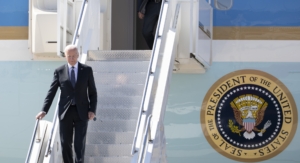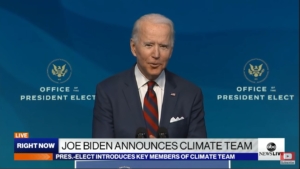Decoupling Disconnect
For years, U.S. presidents stumbled to adequately describe the U.S.-China relationship, unclear whether it was cooperation or competition. In the past decade, the messaging has shifted again. Now, China is viewed as a threat. From ratcheting up tariffs and restricting semiconductor exports to banning social media apps and stymying outbound investment, today’s political landscape for U.S.-China relations is vastly different.
Companies across a broad range of industries find themselves playing catch up with policymaking and public sentiment, and mixed messaging over whether the U.S. aims to decouple or just de-risk doesn’t make it easier. Even as Treasury Secretary Janet Yellen was in China averring it is neither practical nor desirable to completely sever economic ties with China, U.S. Ambassador to Japan Rahm Emanuel was chastising a U.S. Chamber of Commerce delegation’s friendly-seeming meeting with Chinese President Xi Jinping. Meanwhile, President Biden signed legislation forcing a sale of a China-linked social media app and U.S. states aren’t waiting for federal action to crack down on what they view as the threat of Chinese intrusion on their vital interests.
It can all be more dizzying for public affairs professionals than the latest TikTok dance craze as the shifting debate impacts their companies’ ability to raise or invest capital, secure critical minerals and components necessary for the energy transition, utilize emerging advanced technologies, and maintain reliable supply of crucial drug and medical components. Here’s what you need to know to stay ahead of the changing China debate.
Subscribe to Receive Insights
"*" indicates required fields
Tech-No Dance
If you thought you could skip the U.S.-China tech showdown since you don’t have a TikTok account, good luck. This clash goes deeper than a doom scrolling gen-Zer at 2 AM. Start with semiconductors. The Biden Administration has spent the last two years trying to prevent advanced computer chips from reaching China, even as China attempts to build their own chips and global chipmakers warn that decoupling the global chip supply chain from China would be “extremely difficult and extremely expensive.” Now some in the West worry Beijing could dump legacy chips and DRAM—a type of memory chip used in computers—into global markets, undercutting prices in the West and threatening the viability of non-Chinese producers already under pressure to decouple their global supply chain from China.
That decoupling pressures is being felt across the tech industry. Politicians are calling out venture capitalists for financing tech that eventually ends up in the hands of the Chinese military. Intelligence officials are raising alarm over the threat of China’s intellectual property theft. American universities and companies trying to innovate have to dance around their ties to China, including the very personnel they hire. The increasingly chilly conditions across the tech supply chain will impact every company in the global economy.
The Big (Re-)Shore
The growing tech clash is only the leading edge of a broader shift in the global supply chain that began even before COVID, when policymakers—including those on the right—began pushing for ways to secure strategic resources closer to home and ensured American workers could share in the prosperity of producing those resources. COVID accelerated this trend, especially for critical goods like pharmaceuticals, and initiatives like the CHIPS Act and the Inflation Reduction Act extended the push to semiconductors, AI models, and key components for the energy transition like EV batteries, solar panels, and critical minerals.
Yet reshoring is far from easy, and every company with a stake in the global economy will feel the bumps in the road. Even as the U.S. and Europe try to reclaim their manufacturing prowess, China is flooding global markets with a glut of goods. The tension will likely spur further tit-for-tat escalation, as we’re seeing with President Biden’s calls for higher steel tariffs on China and the EU’s investigation of Chinese electric vehicles. But the supply chain shuffle isn’t only a political chess game—there are practical challenges in decoupling that industry and politicians will soon run into headlong. Or already have. The Biden Administration is figuring out that the critical minerals and metals needed for the technology at the heart of their aspirational energy transition, like solar panels, wind turbines, and battery technologies, are largely stuck under Chinese soil or control while remaining off limits to mine here at home. Meanwhile, American solar panel producers are pressuring the Administration to enforce the tariff regime meant to protect them from Chinese dumping.
Ties That No Longer Bind
The pressure to de-risk and decouple is starting to fray economic ties between China and the Western world, leaving some companies with hard choices about which side they’ll take. Foreign direct investment in China has dropped to a 30-year low, and scrutiny on outbound investments has led venture capital firms to split off their China operations, while companies with long-time research ties to China are re-thinking their collaboration. Adding to these pressures in the looming threat of military conflict in Taiwan or further encroachments in the South China Sea, both of which could increase scrutiny of any and all business ties between U.S. companies and China.
Washington, meanwhile, has spent the last few years building capacity to legally sever economic ties, from bolstering the Committee on Foreign Investment in the United States (CFIUS) to restricting U.S. funding of emerging tech in China to recent laws that restrict the import of goods made with forced labor in Xinjiang. But the targeted approach has left many holes to plug in the would-be blockade and politicians among other stakeholders are eager to highlight the shortcomings and address them.
States’ Red Scare
Like many of today’s heated debates, the wrangling over U.S.-China relations is playing out well beyond Washington. State and local officials have raised alarm over land purchases by Chinese companies, and their efforts to deter these purchases sometimes reach far beyond China, impacting buyers even from friendly countries. Many local officials are also pushing through bans on TikTok. Virginia Gov. Glenn Youngkin scuttled a planned EV battery factory over Chinese ownership, in Michigan, voters sacked local officials who signed off on a local Chinese battery facility—both blows to U.S. auto manufacturers’ hopes to blend China’s advanced battery technologies with local production.
The rise of geopolitics at the grassroots level marks an important shift for companies trying to stay ahead on national security issues. While geopolitical watchers keep an eye on world capitals for their smoke signals, today those signals are just as likely to come from state capitals and even town halls, adding a new complexity to an effective geopolitical public affairs operation.
Derisk Your Derisking
Whether your company prefers de-risking, decoupling, or just delaying the inevitable, navigating this new operating landscape requires public affairs professionals to be smart and nimble. Policy attitudes on China aren’t the only area in which conventional wisdom can be overturned in a seemingly rapid manner. If you identify the right stakeholders and understand how to watch them for meaningful but weak signals that the ground may shift. Doing so ensures you not only stay ahead of the curve but shape it. As always, Delve is your partner in building the right information advantage to protect your interests and advance your business and policy objectives, whether they span the globe or are right at home.



